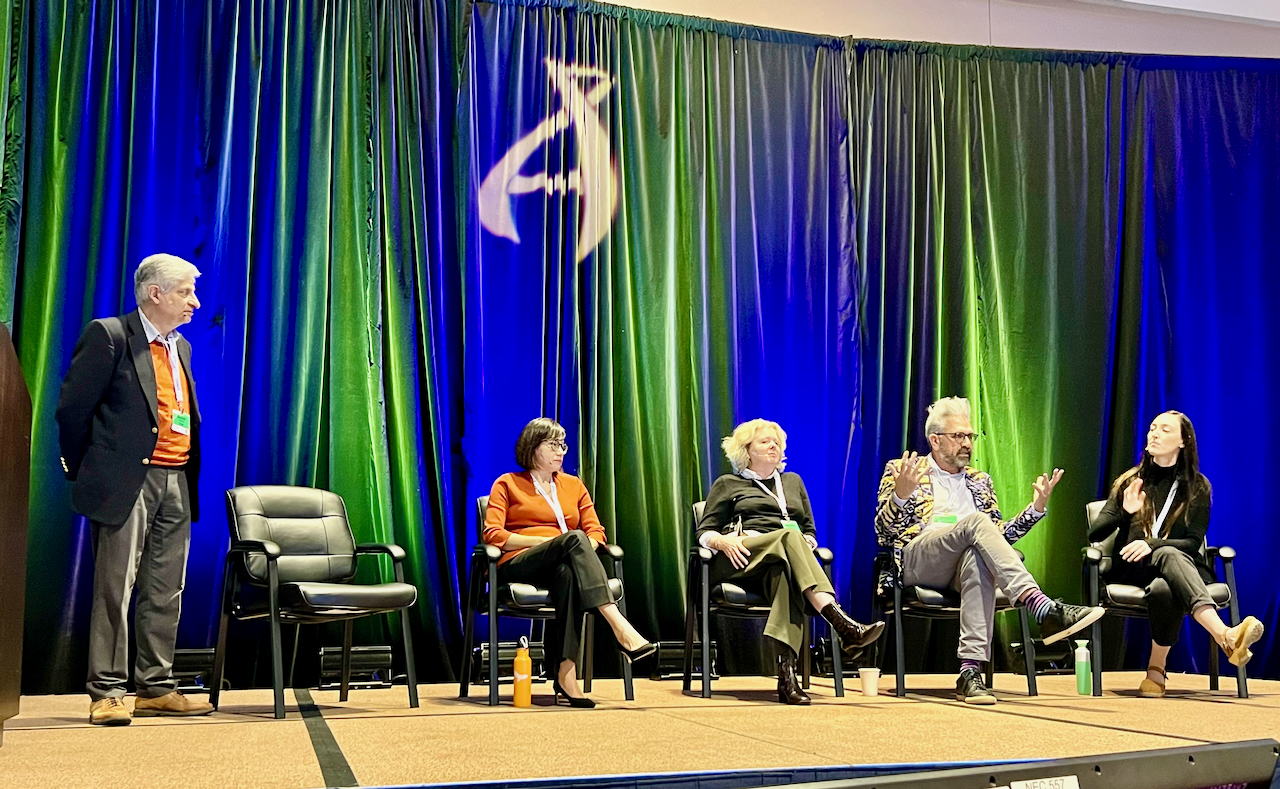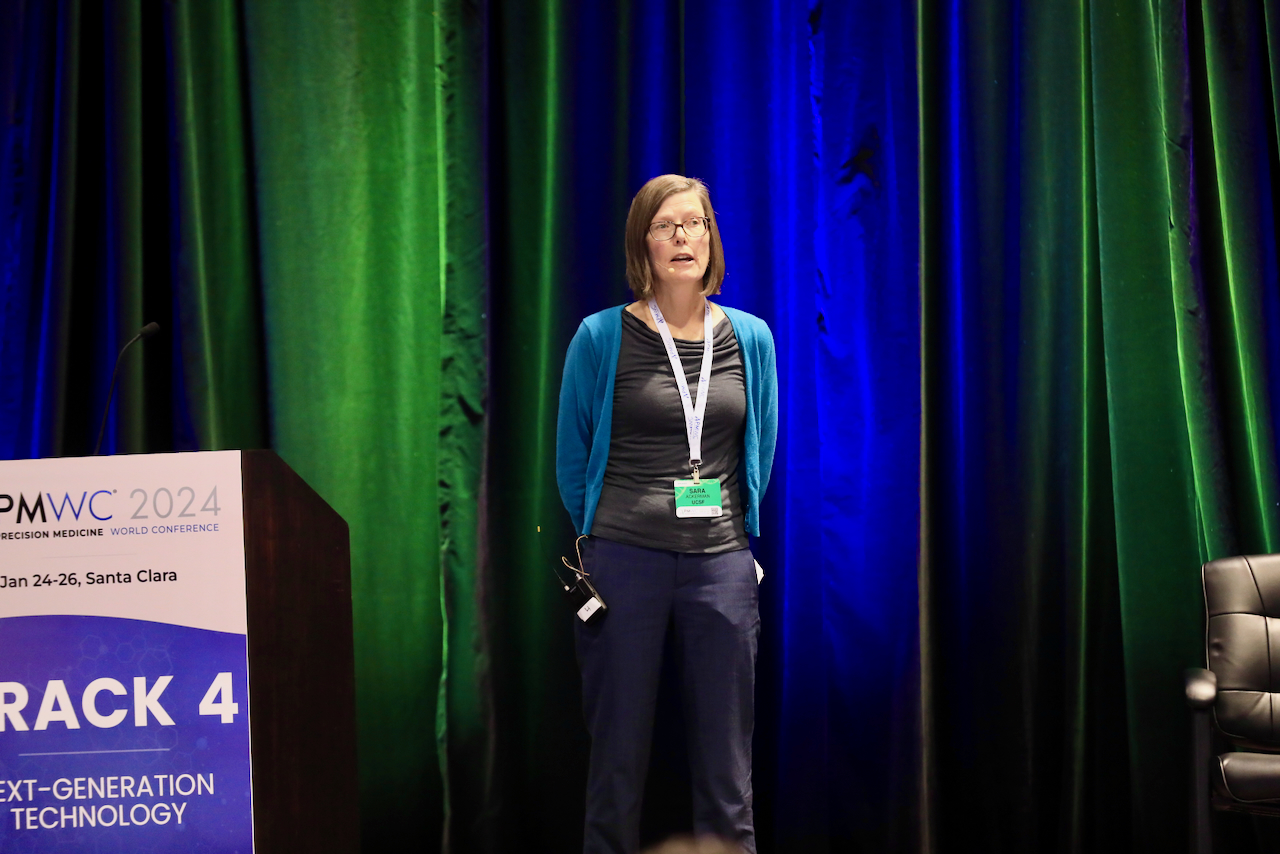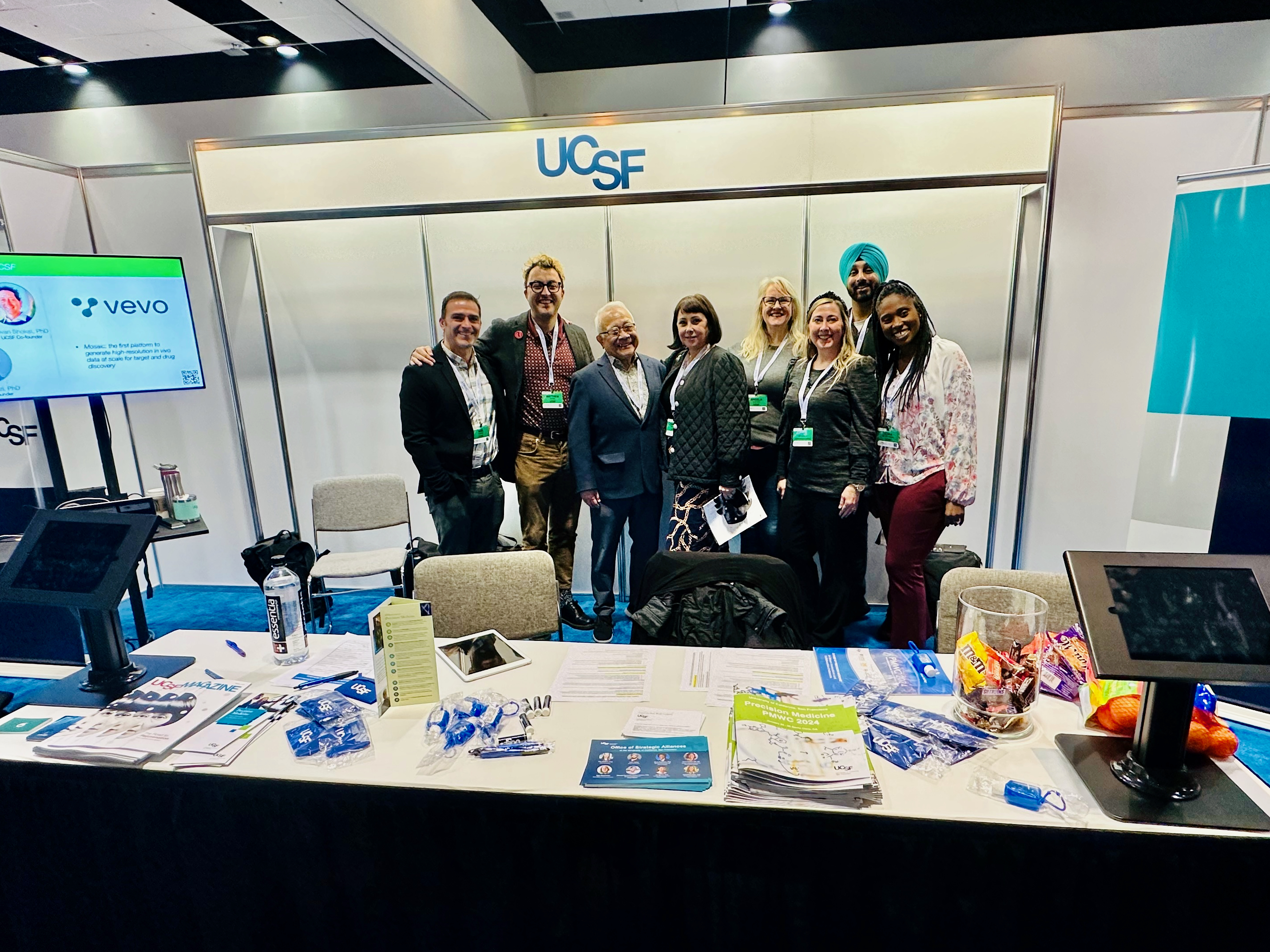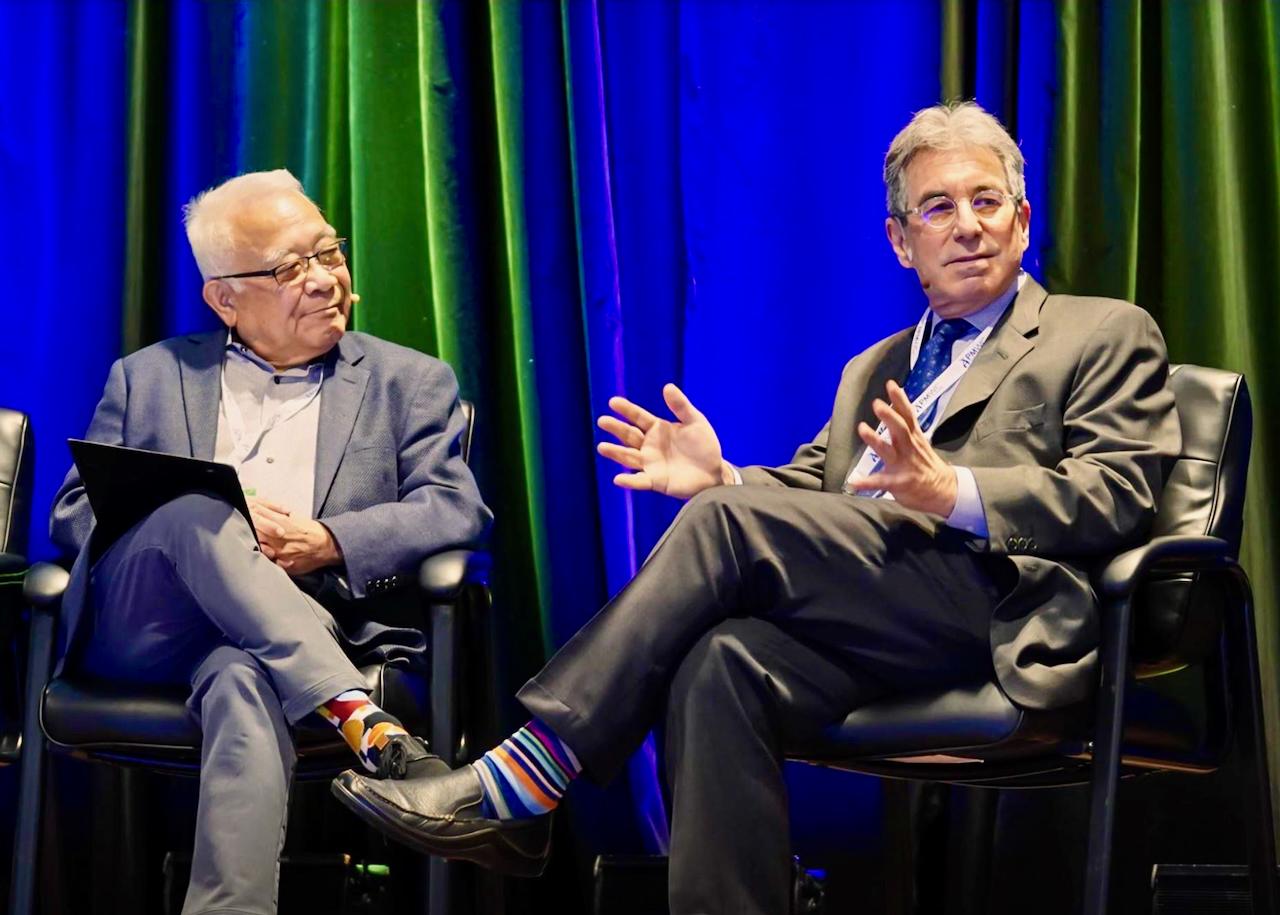
This year, 29 UC San Francisco scientists, experts, and thought leaders participated in several presentations and panels over the three-day Precision Medicine World Conference (PMWC) held on January 24-26, 2024 – the world’s largest precision medicine conference. The forum drew 2,000 people from around the world to foster collaboration, expand the practice and realize the promise of precision medicine. This was the ninth consecutive year UCSF co-sponsored PMWC – a conference known as a vital cornerstone for the healthcare and biotechnology communities.
The opening day kicked off with a high-profile track, “New Frontier of Precision Medicine.” Its opening panel, “New Federal Programs Driving Transformative Health Breakthroughs,” chaired by Keith R. Yamamoto, PhD, vice chancellor for Science Policy and Strategy, and director of Precision Medicine at UCSF, included speakers from the Advanced Research Projects Agency for Health (ARPA-H), National Science Foundation (NSF) and National Institute of Standards and Technology (NIST). Yamamoto has been involved in planning the conference since UCSF started co-sponsoring the event. In this dynamic session, he engaged federal science and technology agency panelists to illuminate innovative government initiatives and opportunities to enhance and expand precision medicine.
Yamamoto stated that this new panel addressed “one of the most daunting yet exciting properties of precision medicine – its scope covering many science and technology disciplines, social and population sciences, high-performance computing and AI, and drawing on many stakeholder sectors.” He emphasized that academia, the non-profit and for-profit private sectors, the government, and the public deserve to benefit.
As the AI revolution continues to garner attention in healthcare and research, it was no surprise that the following session, “AI-driven Advances in Precision Medicine,” chaired by Sharat Israni, PhD, UCSF Bakar Computational Health Sciences Institute CTO, was standing room only. Panelists included UCSF’s Nevan Krogan, PhD, recipient of the Research!America Discovery Innovation Health Prize in 2023. Krogran shared that though he focuses on ‘the molecular level’ - investigators now need to look at modular properties, predict, and connect technologies - and see how “AI connects and transverses across these to get from molecular to clinical.”
The “Precision Medicine in New Research Frameworks'' session also had a significant UCSF presence, led by Regis Kelly, PhD, director of the QB3 Institute with UCSF panelists Joe DeRisi, PhD, president of the Chan Zuckerberg Biohub SF, and Luke Gilbert, PhD, ARC Institute (affiliated with UCSF/Stanford/UC Berkeley), as well as Prachee Avasthi, PhD, co-founder of Arcadia Science (former UCSF postdoctoral scholar). Kelly sparked panelists to share how their respective private endeavors are accelerating science, and they described several approaches including partnerships with universities (i.e., not pulling people out of academia), rapid open data/science, worldwide ‘biohubs’, and self-sustaining endowments.

The concluding session from the New Frontier track, “AI and Precision Medicine: Navigating Equity and Social Justice Challenges,” included Sara Ackerman, PhD, MPH, who works on community-engaged research at the Clinical and Translational Science Institute (CTSI) at UCSF.
Ackerman alluded to ethical concerns like algorithmic bias (also discussed by co-panelist Ziad Obermeyer, MD, UC Berkeley), transparency, privacy and consent (e.g., the use of personal data and its potential risk to individuals), and accountability, which includes ensuring alignment with values and fairness in impacts across groups. “How do we govern the use of AI? The traditional model, which predates AI, mainly focuses on compliance with existing laws and regulations,” posed Ackerman.
She also pointed out that “expert-driven” data policies often have no or little involvement of patients and that there have been more calls for a participatory or shared governance model. Her team at CTSI tries to understand what patients and community members think about the use of their health data and strives toward a shared governance data model, with the goal of UCSF adopting a justice-focused approach.
UCSF Innovation Ventures
Amy Gryshuk, PhD, and Mike Papac, PhD, presented during the PMWC 2024 Digital Health Showcase Track and provided an overview of UCSF Innovation Ventures (IV), an organization dedicated to helping UCSF’s research and clinical communities navigate the complexities of translational technology development and commercialization. UCSF Innovation Ventures’ overarching goal is to support the transition of UCSF innovation into the marketplace to help advance health worldwide.

Gryshuk and Papac showcased the evolution of two UCSF technologies from disclosure to development to technology translation. Charlotte Nelson, PhD, CEO, introduced MATE Bioservices’ platform that accelerates scientific breakthroughs by making interdisciplinary research effortless for a single individual. From NASA to the top 10 pharma companies, MATE Bioservices powers researchers across the research and development ecosystem. Kat Schmolly, CEO and founder, highlighted ZebraMD’s AI-powered point-of-care clinical decision support to improve diagnosis, management, and research of patients with rare or genetic diseases. In closing, the showcase stressed that UCSF Innovation Ventures is open for business and committed to working closely with research and clinical faculty, postdoctoral researchers and students, and industry partners to accelerate the process of bringing new products and services to market to impact health.
The UCSF sponsor booth has been organized in recent years in collaboration with UCSF Precision Medicine (PM) and UCSF Innovation Ventures, and this year was staffed by more than 45 volunteers including PM, IV, the UCSF Industry Contracts Division, and other UCSF colleagues. Participants from academia, industry, start-ups, foundations, government, and the investment community visited the booth to learn more about UCSF and explore potential collaborations and engagement opportunities.
Pioneer Award
The second day of the conference started with honoring the PMWC Pioneer Award recipient Atul Butte, MD, PhD, director of the UCSF Bakar Computational Health Sciences Institute (BCHSI), Priscilla Chan and Mark Zuckerberg Distinguished professor, and chief data scientist for the entire UC Health System. This award is given to a venerable individual whose foresight and groundbreaking contributions to precision medicine propelled the movement in its early years. Butte was recognized for his outstanding contributions to precision medicine, including analyzing large-scale biomedical data, uncovering novel insights to improve patient care, and impacting the field through research on big data analysis, drug repurposing, biomarker discovery, patient stratification, and data-driven clinical decision support.
Keith Yamamoto presented the award, noting Butte’s pivotal role in launching the California Initiative to Advance Precision Medicine (CIAPM) and as chief data scientist for UC Health. In his virtual acceptance of the award, Butte acknowledged that the 2011 National Academies consensus report on precision medicine taught him that “we need accurate diagnostics, targeted therapeutics, and to understand the actual practice of precision medicine.” Butte noted that one component is still largely missing – the adoption of new technologies by doctors. Butte underscored that most patients are not privileged enough to challenge the resistance to the adoption of new precision medicine tools: “We need to think about this as our next step, the ‘last mile’ problem in precision medicine.”

Learn more about other sessions over the three days featuring UCSF faculty and staff:
- Systems and Sex Differences, Monica Gandhi
- Living Therapeutics for Precision Medicine, Michelle Hermiston, Wendell Lim
- Metagenomic Sequencing Challenges in Microbiology Labs, Charles Chiu
- Utilities of Liquid Biopsy in Biomarker Testing, Laura van ‘t Veer
- Sex Differences in Alzheimer's Disease, Marina Sirota
- Health IT and Interoperability Policy, Julia Adler-Milstein
- Showcase: Pharmacogenomics, Bani Tamraz
The UCSF PMWC online brochure includes the complete list of UCSF speakers and presentations.
Advancing precision medicine continues to be a top priority at UCSF and is central to its mission of advancing health worldwide. UCSF faculty lead numerous local, state and national efforts to use data-driven tools to develop new diagnostics, therapies, prevention measures and insights into disease. PMWC 2024 showcased how these efforts contribute to the ultimate goal of precision medicine – improved individual and population health.
